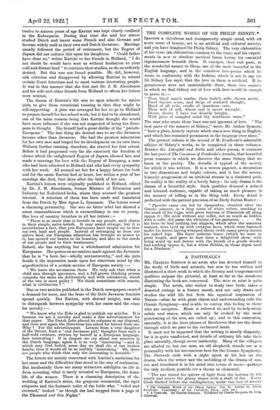THE COMPLETE WORKS OF SIR PHILIP SIDNEY.* lateen/a a chivalrous
and transparently simple mind, with an acute sense of beauty, set in an artificial and cultured society, and you have imagined Sir Philip Sidney. The very elaboration of his verse (an elaboration common to the time) and his experi- ments in new or obsolete metrical forms betray his essential ingenuousness beneath them. It emerges, clear and pure, in the wonderful sonnet to Sleep, one of the most beautiful in the English language, and in the countless love-poems which he wrote in conformity with the fashion, which is not to say (as Sir Sidney Leo says) that the love in them is artificial. If itt genuineness were not unmistakable there, those two sonnets in which we find Sidney out of love with love would be enough to prove it :-
"Thou blind man's marks, thou foole's selfe chosen snare,
Fond fancies scum, and dregs of scattred thought, Band of all evils, cradle of causeless° care, Thou web of will, whose end is never wrought.
Desire, desire, I have too doarely bought, With prise of mangled mind thy wortldesse ware."
The man who wrote those lines was not ignorant of love. " The best parts of the sonnets of Sidney," wrote Mr. Arthur Symons, " have a plain, homely rapture which was a new thing in English, and which has remained permanent in the language ever since."
The present volume is the second of M. Feuillerat's admirable edition of Sidney's works, to be completed in three volumes. Besides the Astrophel and Stella and other poems, it contains the last part of The Oountesse of Pembroke's Arcadia, that beautiful prose romance in which we discover the same Sidney that we know in the poetry. The Arcadia is typical of the society for which it was written. It is a woven pageant, a decoration in two dimensions and bright colours, and it has the serene, leisurely progression of an artificial stream in a timbered park. Its reality is the reality of a lovely fancy : its only drama is the drama of a beautiful style. Such qualities demand a refined
and leisured audience, capable of taking as much pleasure in the manner of telling as in the thing told. Every detail is perfected with the patient precision of an Early Italian Master :-
" Pyroclar came out led by Sympathus, cloathed after the Greek° manner, in a long coats of white velvet, reaching to the small of his legge, with great buttons of Diamonds all along uppon it : His neck without any collar, not so much as hidden with a ruffs, did passe the whitens of his garments. . . . On his foots he had nothing but slippers, which after the auncient manner, were tyed up with certayne laces, which were fastened under his knee, having wrapped about (with many pretty knots) his naked legs. His fayre auberne hears (which he ware in great length, and gave at that timo a delightfull show, with being sturd up and downe with the breath of a gentle winde) had nothing uppon it, but a white Ribbin, in those dayes used for a Diadems."


































 Previous page
Previous page